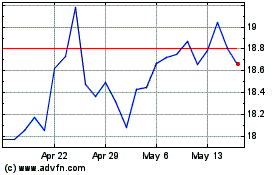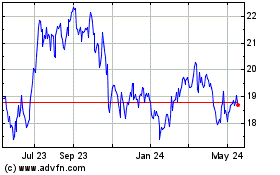Mattel, Inc. (NASDAQ: MAT) today announced that Anthony
DiSilvestro, Chief Financial Officer (CFO), has informed the
Company of his plans to retire on May 15, 2025. The Company has
initiated a comprehensive search process with the assistance of a
leading executive search firm. Following his retirement date,
DiSilvestro will serve as an advisor through August 15, 2025, to
ensure a smooth transition.
Ynon Kreiz, Chairman and CEO of Mattel, said: “Anthony has
played a key role in steering Mattel to achieve its strongest
financial position in many years. On behalf of Mattel’s Board of
Directors and management team, we express our gratitude for
Anthony’s significant contributions to Mattel’s transformation into
an IP-driven, high-performing toy company and wish him the very
best in his retirement.”
DiSilvestro joined Mattel in August 2020. During his five years
as CFO, Mattel achieved an investment grade rating, strengthened
its financial organization, optimized operations, and increased
efficiencies with over $400 million of cost savings.
DiSilvestro added: “It has been an honor working alongside Ynon
and the talented team at Mattel at such an exciting time in its
history. I am proud of all we have accomplished together and
believe the Company is well positioned to continue executing its
multi-year strategy and create long-term shareholder value. As I
move to the next chapter of my life in retirement, I look forward
to watching Mattel’s continued success for years to come.”
About Mattel
Mattel is a leading global toy and family entertainment company
and owner of one of the most iconic brand portfolios in the world.
We engage consumers and fans through our franchise brands,
including Barbie®, Hot Wheels®, Fisher-Price®, American Girl®,
Thomas & Friends™, UNO®, Masters of the Universe®, Matchbox®,
Monster High®, MEGA® and Polly Pocket®, as well as other popular
properties that we own or license in partnership with global
entertainment companies. Our offerings include toys, content,
consumer products, digital and live experiences. Our products are
sold in collaboration with the world’s leading retail and ecommerce
companies. Since its founding in 1945, Mattel is proud to be a
trusted partner in empowering generations to explore the wonder of
childhood and reach their full potential. Visit us at
mattel.com.
Cautionary Note Regarding Forward-Looking Statements
Mattel cautions the reader that this press release contains a
number of forward-looking statements, which are statements that
relate to the future and are, by their nature, uncertain.
Forward-looking statements can be identified by the fact that they
do not relate strictly to historical or current facts and include
statements regarding Mattel’s guidance and goals for future periods
and other future events. The use of words such as “anticipates,”
“expects,” “intends,” “plans,” “projects,” “look forward,”
“confident that,” “believes,” and “targeted,” among others,
generally identify forward-looking statements. These
forward-looking statements are based on currently available
operating, financial, economic, and other information and
assumptions, and are subject to a number of significant risks and
uncertainties. A variety of factors, many of which are beyond
Mattel’s control, could cause actual future results to differ
materially from those projected in the forward-looking statements.
Specific factors that might cause such a difference include, but
are not limited to: (i) Mattel’s ability to design, develop,
produce, manufacture, source, ship, and distribute products on a
timely and cost-effective basis; (ii) sufficient interest in and
demand for the products and entertainment Mattel offers by retail
customers and consumers to profitably recover Mattel’s costs; (iii)
downturns in economic conditions affecting Mattel’s markets which
can negatively impact retail customers and consumers, and which can
result in lower employment levels and lower consumer disposable
income and spending, including lower spending on purchases of
Mattel’s products; (iv) other factors which can lower discretionary
consumer spending, such as higher costs for fuel and food, drops in
the value of homes or other consumer assets, and high levels of
consumer debt; (v) potential difficulties or delays Mattel may
experience in implementing cost savings and efficiency enhancing
initiatives; (vi) other economic and public health conditions or
regulatory changes in the markets in which Mattel and its customers
and suppliers operate, which could create delays or increase
Mattel’s costs, such as higher commodity prices, labor costs or
transportation costs, or outbreaks of disease; (vii) the effect of
inflation on Mattel’s business, including cost inflation in supply
chain inputs and increased labor costs, as well as pricing actions
taken in an effort to mitigate the effects of inflation; (viii)
currency fluctuations, including movements in foreign exchange
rates, which can lower Mattel’s net revenues and earnings, and
significantly impact Mattel’s costs; (ix) the concentration of
Mattel’s customers, potentially increasing the negative impact to
Mattel of difficulties experienced by any of Mattel’s customers,
such as bankruptcies or liquidations or a general lack of success,
or changes in their purchasing or selling patterns; (x) the
inventory policies of Mattel’s retail customers, as well as the
concentration of Mattel’s revenues in the second half of the year,
which coupled with reliance by retailers on quick response
inventory management techniques, increases the risk of
underproduction, overproduction , and shipping delays; (xi) legal,
reputational, and financial risks related to security breaches or
cyberattacks; (xii) work disruptions, including as a result of
supply chain disruption such as plant or port closures, which may
impact Mattel’s ability to manufacture or deliver product in a
timely and cost-effective manner; (xiii) the impact of competition
on revenues, margins, and other aspects of Mattel’s business,
including the ability to offer products that consumers choose to
buy instead of competitive products, the ability to secure,
maintain, and renew popular licenses from licensors of
entertainment properties, and the ability to attract and retain
talented employees and adapt to evolving workplace models; (xiv)
the risk of product recalls or product liability suits and costs
associated with product safety regulations; (xv) changes in laws or
regulations in the United States and/or in other major markets,
such as China, in which Mattel operates, including, without
limitation, with respect to taxes, tariffs, trade policies, product
safety, or sustainability, which may increase Mattel’s product
costs and other costs of doing business, and reduce Mattel’s
earnings and liquidity; (xvi) business disruptions or other
unforeseen impacts due to economic instability, political
instability, civil unrest, armed hostilities (including the impact
of the war in Ukraine and geopolitical developments in the Middle
East), natural and man-made disasters, pandemics or other public
health crises, or other catastrophic events; (xvii) failure to
realize the planned benefits from any investments or acquisitions
made by Mattel; (xviii) the impact of other market conditions or
third party actions or approvals, including those that result in
any significant failure, inadequacy, or interruption from vendors
or outsourcers, which could reduce demand for Mattel’s products,
delay or increase the cost of implementation of Mattel’s programs,
or alter Mattel’s actions and reduce actual results; (xix) changes
in financing markets or the inability of Mattel to obtain financing
on attractive terms; (xx) the impact of litigation, arbitration, or
regulatory decisions or settlement actions; (xxi) Mattel’s ability
to navigate regulatory frameworks in connection with new areas of
investment, product development, or other business activities, such
as artificial intelligence, non-fungible tokens, and
cryptocurrency; (xxii) an inability to remediate the material
weakness in Mattel's internal control over financial reporting, or
additional material weaknesses or other deficiencies in the future
or the failure to maintain an effective system of internal control;
and (xxiii) other risks and uncertainties as may be described in
Mattel’s filings with the Securities and Exchange Commission,
including the “Risk Factors” section of Mattel’s Annual Report on
Form 10-K for the fiscal year ended December 31, 2023 and
subsequent periodic filings, as well as in Mattel’s other public
statements. Mattel does not update forward-looking statements and
expressly disclaims any obligation to do so, except as required by
law.
MAT-FIN MAT-CORP
View source
version on businesswire.com: https://www.businesswire.com/news/home/20250116893276/en/
News Media Catherine Frymark
Catherine.Frymark@mattel.com
Securities Analysts Jenn Kettnich
Jenn.Kettnich@mattel.com
Mattel (NASDAQ:MAT)
Historical Stock Chart
From Dec 2024 to Jan 2025

Mattel (NASDAQ:MAT)
Historical Stock Chart
From Jan 2024 to Jan 2025
